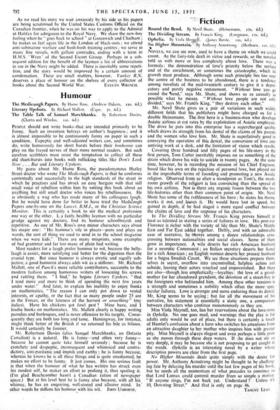Fiction
Round the Bend. By Nevi! Shute. (Heinemann. 12s. 6d.) No Higher Mountain. ' By Anthony Armstrong. (Methuen. tos. 6d.)
110vEts, we can see now, used to have a theme on which we could count. As the fairy-tale dealt in virtue and rewards, so the novelist told us with more or less complexity about love. There was a formula: the demonstration of love's priority below the surface and of the enrichment, or sometimes the catastrophe, which its growth must produce. Although some such principle lies too near the centre of the business to be abandoned, there is a tendency among novelists of the mid-twentieth century to give it a depre- catory and purely negative restatement. " Without love you go round the bend,". says Mr. Shute, and shows us as casually as possible what he means. "Without love people are not only divided," says Mr. FranCis King, " they destroy each other."
Mr. Nevi! Shute gives us a pair of variations in such• widely different fields that his publishers might have charged us for a double Heinemann. The first hero is a business-man who develops Asiatic airlines at cut rates by the exploitation of Asiatic employees. The drive he puts into this enterprise has a supercharged quality which draws its strength from his denial of the claims of his parents and the women who love him. Mr. Shute is superlatively good in conveying the operation of this denial, the conversion of love into untiring work at a desk, and the limitation of vision which results.
Covering three hundred and fifty pages of his life-story in the first person, Tom Cutter inevitably imposes on us something of the strain which drove his wife to suicide in twenty pages. At the same time, however, he is recording the mission of his Chief Engineer, based like his own on the rejection of personal love, but played out in the improbable terms of founding and promoting a new Asiatic religion. Observed from so alien a standpoint as Tom's, the mush. room growth of the religion is less convincing than the spread of his own airlines. Nor is there any organic fusion between the two life-histories other than their common point of origin. Mr. Nevi! Shute has some of the ruthlessness of his hero ; he states his theme. works it out, and .leavei it. 'He would have lost in speed, but gained in depth, if he had staged a more equal conflict between the claims of love and the response of his characters.
In The Dividing Stream Mr. Francis King proves himself at least as talented in stating a series of failures in love. His post-war Florence is richer with the variety of life than Mr. Shute's Middle East and Far East added together. Deftly, and with an admirable ease of narrative, he .4ioves among a dozen relationships criss• crossing between nationalities and social classes. Some of them grow in importance. A wife deserts her rich American husband for a neurotic Communist ; an Italian secretary deserts her fiancé for a rich American ; an English woman deserts her prosaic husband for a bogus Swedish Count. We see these situations prepare them- selves in secret, overflow into uncontrolled, helpless action and subside, leaving their actors wrecked and impoverished. But there are also—though.less emphatically7loyalties: the love of a grand- mother for her abandoned grandson, the devotion of a street-boy to the foreigners who befriended him. Among these other tensions is a strength and sometimes a nobility which offset the more spec- tacular failures. Love is stronger and more enduring than its denial, Mr. King seems to be saying ; but for all the movement of his narrative, his statement is essentially a static one, a comparison between characters who continue monotonously as they are. Miss Viola Meynell, too, has her reservations about the love-story in Ophelia. No one goes mad, and warnings that the play is for adults only would be out of place, but there is certainly a touch of Hamlet's confusion about a hero who switches his attentions from an attractive daughter to her mother who inspires him with greater pity. Miss Meynell is always elegant and even perhaps a little prim as she moves through these deep waters. If :Ise does not stir us very deeply, it may be because she is not proposing to get caught in the weeds. Ophelia is an interesting novel by a writer whose descriptive powers are clear from the first page. No Higher Mountain deals quite simply with the desire for power. Mr. Anthony Armstrong might be thought to be challeng- ing fate by delaying his murder until the last few pages of his book, but he needs all the momentum of what precedes to convince us that Lord Lomax could commit murder from so simple a motive. " If anyone rings, I'm not back yet. Understand ? Unless it's 10, Downing Street." And that is only on page 46.
TANGYE LEAN. TANGYE LEAN.


































 Previous page
Previous page